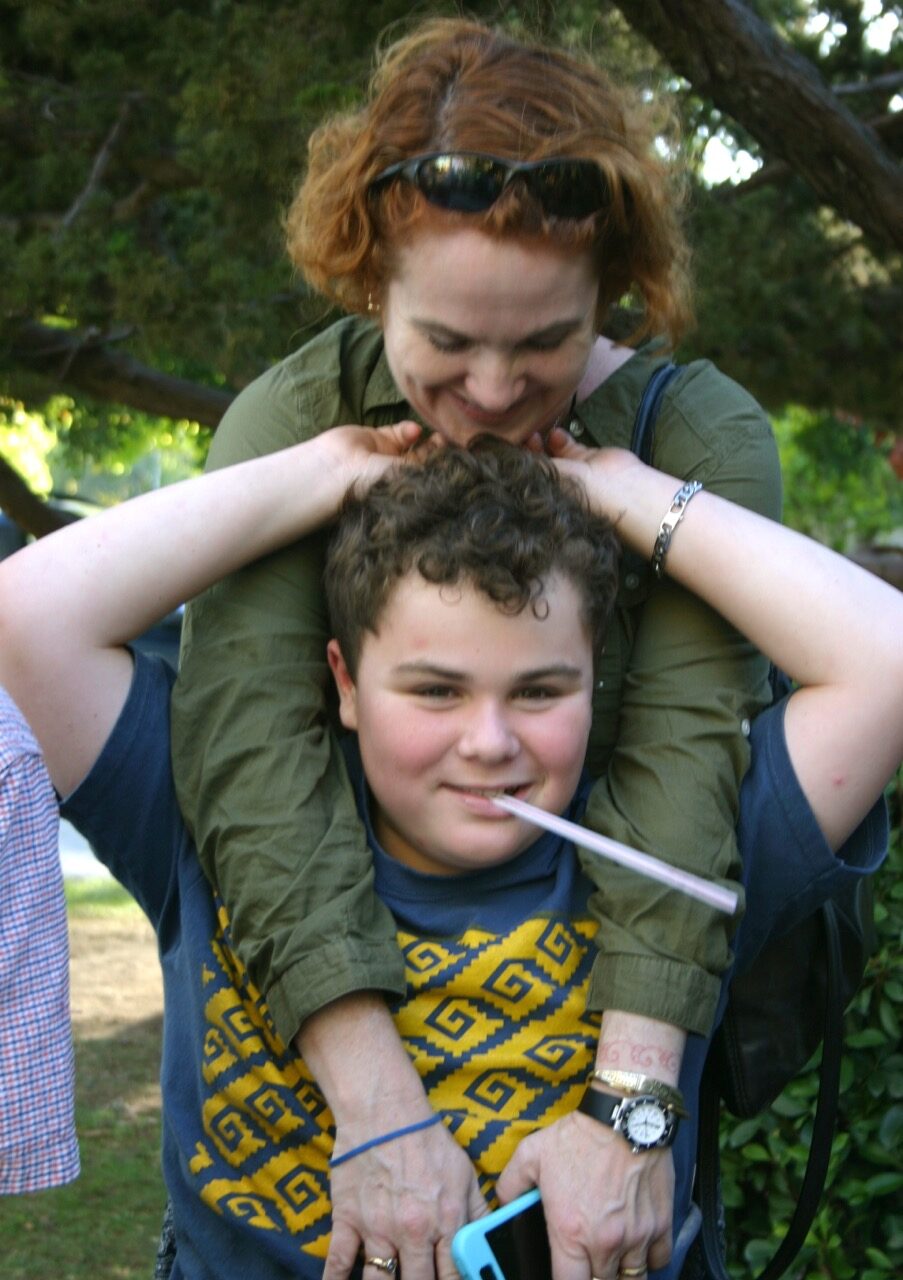Shannon Des Roches Rosa www.squidalicious.com Content note: This article discusses abuse and murder. Photo © Steve Silberman [image: a white woman, standing behind a white teen boy with brown curly short hair. He is looking at the camera. Her arms are over his shoulder, his arms are up and tickling under her chin.] When parents like me talk about our kids with disabilities and intense support needs, we have to be thoughtful. We need to make it quite clear that our kids are much-loved and very awesome human beings. We should never, ever state or imply that any challenges we face as a parent are our children’s fault. We need to handle their privacy with delicacy. And we shouldn’t accidentally enable disrespect towards children who are already too-frequent magnets for morbid fascination, and pity. But we do need to talk, because our parenting gig is not like other parenting gigs.…
Tag: resources
Dr. Poinsett aka Godmother Doc and @yayayarndiva [image: photo of a Black woman with short silver-and-black hair.] Dr. Pierrette Mimi Poinsett Over the last year, the Nation of Islam — which does not represent mainstream Islam — has resurrected the fallacious “CDC Whistleblower” argument that vaccines, and the MMR vaccine in particular, is causing autism in Black males. That autism is something to be feared, eradicated. At times the rhetoric has gone so far as to accuse vaccines of killing black and brown children. As both a Black pediatrician and mother of a son with severe mental health and learning disorders, I know that vaccines prevent diseases, save lives, and do not cause autism. Many studies unequivocally show that there is no connection between vaccine components and the development of autism. Autism manifests independently of the vaccine schedule. The reality is that autism is a complex neurodevelopmental condition that likely…
Shannon Des Roches Rosa www.Squidalicious.com “Stress is involved in almost every incident of serious child abuse, but it should not be seen as a mitigating factor more than any other source of stress should be seen as a mitigating factor. By and large, parents of people with disabilities are able to take care of their children without trying to kill them.” –Samantha Crane Whenever a news story breaks about a parent killing (or trying to murder) a disabled child, reactions to the story are almost as disturbing as the story itself — because media and blog accounts tend to empathize with the parents, not the child victims. In fact the children in these cases are almost universally depicted as trigger for their parents’ acts, rather than human beings with feelings, friends, interests, and rights. We need to change those conversations. Photo © Shannon Des Roches Rosa [image: white teen boy…
The Thinking Person’s Guide to Autism has been humming along for over a year now, and we’ve shared more than 200 great interviews, stories and how-to’s here. We’ve watched the TPGA Facebook page grow with active, vibrant discussions, and we love seeing many different perspectives pop-up in those comments. It’s encouraging, knowing these pages have provided a positive, supportive and safe environment for discussion and questions. We are seeing a community come to life here, and it’s exciting. Editing is under way on the book, The Thinking Person’s Guide to Autism, with a plan to publish later this fall. In an effort to get the best resources into the print version, we are putting out one last call to our readers and contributors: Share the wealth of knowledge you have collected. If you have an online resource, book, service, government agency or other great person, place, or thing that we…
I met with Eric Peacock, the GM of MyAutismTeam and Insider Pages. He believes strongly in community, and empowering patients, and proudly retweets many of the posts from TPGA. This is not a promotion, or an advertisement for MyAutismTeam, although Eric did buy me breakfast (thank you Eric). MyAutismTeam is a resource with headquarters based in San Francisco, near three of the TPGA editors, so being an active part of this new resource has been a natural extension of our general interest in community education. TPGA will not make any money from posting this information. It is our sincere desire to highlight companies, both non- and for-profit, which we feel can help our community, and welcome suggestions for other companies and agencies to showcase. If you choose to use MyAutismTeam, and we hope you do, please provide feedback on the site as you use it so it can become an even…
Kim Dull www.modernparentonline.com (Coming Soon!) I’m a mom to three kids. I have a daughter, who’s almost seven. (I was going to refer to her here as Princess BossyMcBossypants since she thinks she’s in charge of the household, but that seemed a little excessive. So we’ll go with Princess.) I have a son, who’s five and a half (heretofore referred to as Monkey Man). And I have another son, who’s almost four (let’s call him Bubs). Princess is what you’d call “neurotypical,” or “typically developing.” In other words, she’s a normal stubborn, bossy, temperamental, yet ultimately very sweet and caring little girl. Bubs has some slight developmental delays. He receives therapy for speech, fine motor, and social concerns. But we’ve been very lucky that he’s pretty much caught up with his peers thanks to early intervention and the services provided by our local school system. But this story is about…
Researchers from Columbia University have asked for our help in reaching out to parents on their project, which has such similar goals to The Thinking Person’s Guide to Autism. We hope that parents of children with autism who can participate, will. Thank you, -Shannon, Liz, Jen, & Emily, TPGA Editors Dear Parent, We are researchers at Columbia University’s Institute for Social and Economic Research and Policy studying autism. We are currently collecting life stories from parents about their experiences in recognizing their child’s autism, seeking professional help and navigating the system of services. The goal of this project is to gain a better understanding of the road to diagnosis. Parents have different experiences and observations of their child’s development and they have different personal resources with which they access care and services. Parents also differ in the type and extent of their support networks and social relations. And finally parents…
A Community Book and Blog Project The Thinking Person’s Guide to Autism (TPGA) is the book and website we wish had been available when our children with autism were first diagnosed. We want to help people with autism and their families make sense of the bewildering array of available autism treatments and options, and determine which are worth their time, money, and energy. Think of us as a little bit of Snopes for the autism community — trusted, accurate, and friendly. Our essays will cover informed approaches to autism and autism treatments, as well as the personal experiences of people with autism and their families. Our attitude is cautionary yet loving — we’re honest, but we’re not interested in negativity. We envision TPGA as a community-based effort, with the very best writing on evidence-based approaches to autism from autistics, family members, and professionals. If you have something to say about…




